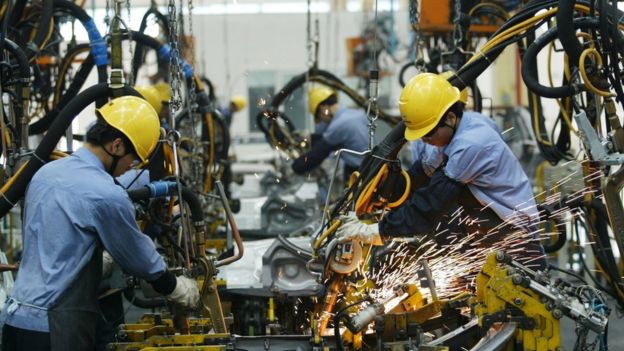China is rushing through a foreign investment law in an apparent attempt to placate Washington as negotiators try to dig the world’s two largest economic powers out of an ongoing trade war. But will it work?
The 3,000 or so delegates to China’s annual National People’s Congress (NPC) will endorse the new law on Friday. They don’t oppose legislation. That’s not how it is done here.
When a vote is taken there are normally only a handful who vote against. Some of them potentially for show, because 100% “yes” votes one after another would look ridiculous.
If there is pushback against a draft bill and amendments made, this happens well before the NPC sits, at a series of standing committee meetings behind closed doors. The process can take years.
This time it took three months.
The Chinese government appears to have rushed through the investment law as an olive branch to the US amid trade war negotiations.
However, many in the business community here in China see this law as a kind of sweeping set of intentions rather than a specific, enforceable set of rules. They fear it could be open to different and changing forms of interpretation.

The big-ticket items it is said to address, in terms of the concerns of foreign companies, include intellectual property theft, the requirement for international firms to partner up with a local entity, and unfair subsidies to Chinese companies.
It will also address the preferential treatment in awarding contracts to Chinese companies, and forcing foreign firms to hand over their technological secrets as the price of entry to the massive Chinese market.
But this law isn’t going to help everyone.
There is a “black list” of 48 sectors that will not be open to foreign investment or, in some cases, not open without conditions or special permission.
For example, there is a complete ban on investing in fishing, gene research, religious education, news media, and television broadcasting.
Partial investment is allowed in oil and gas exploitation, nuclear power, airlines, airport operation, and public health, amongst others sectors.
Non-renewable energy automobile production will require partnerships for a few years but then be phased out.
For industries not on the list, the principle is that foreign companies will receive the same treatment as their Chinese counterparts.

But should foreign companies also be wary?
One of the provisions will include a requirement for the local subsidiaries of international firms to report various details of their operation to Chinese officials.
This could include performance indicators relating to labour relations, overall staffing numbers, pollution records and the like.
That sounds fine except that foreign companies have asked for – and not received – legal guarantees that this data will not be passed on to their Chinese competitors.
Then there is the promised complaints procedure should you seek redress following any perceived violations of the new law.
If this system is run through the normal Chinese courts, which routinely guarantee results favourable to the Communist Party, then to many this would not seem like a satisfactory enforcement mechanism.
One part of the law specifies that there is to be a ban on “illegal government interference” in the activities of foreign business.
The further you go up the government ladder the more implausible it would be to win in such a dispute.
Over the years we have reported on many cases of foreign businesspeople, especially ethnic Chinese, who have been sent to prison on highly questionable charges following a commercial dispute with a local business person who enjoys the backing of low-level Communist Party cadres.
Those here with long memories know this and are approaching the new law with an understandable level of caution.

